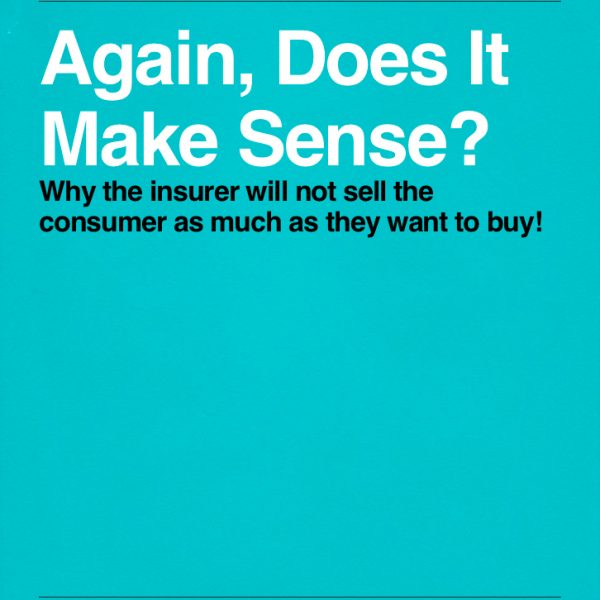I am not a fan of Stephen King’s writings but my children are avid readers and movie goers for all King’s creations. Actually they are hardly children anymore as the youngest is now 18 years and 8 months old. Thus I wrote the references to King’s writings out o respect for my children’s tastes in literature and movies. It is hard to escape the public relations when either book or movie hits the streets. I do like horror movies but not his.
When there was a flurry of publicity over the latest King launches it made me think of the horrors that arise in the minds of insurance people (seller and risk selector) when ever the task of underwriting or merely processing a case is the issue. As old as insurance I am sure is the debate or confrontation between the producer and underwriter.
With events in the Canadian distribution segment looking for a target for its poor closure on large cases Steve (again the erstwhile editor of Marketing Options) asked me kindly to write a little on the subject of relations between agent and underwriter.
I did and as it turns out it is one of those themes that I am constantly asked to write or speak about in Canada and around the globe. I am no expert but have lots of experiences. I do not have all the answers but have an opinion. Steve liked to print for all to see my opinion.
Ross
2004-04-13
Marketing Options
May 1992
The distance between the agent and the head office underwriter is probably greatest when the issue is financial underwriting. Then Lucidity fades as the sun dies. Long, deep shadows of mistrust and deception sweep over a barren landscape. It’s a setting created by the Master of Horror, Stephen King, where one can never be sure who or how many will pay the ultimate price before the tale is told.
In this morbid setting, the head office underwriter talks in terms of theory and the agent talks in terms of reality, all the makings for a macabre sequence of events. As the underwriter delves menacingly (in the eyes of the agent) into the file, the agent becomes nauseous with despair (in the eyes of the underwriter). The slithering tentacles of the underwriter entwine the case as it attacks with more and more vile questions and bone-crushing requests. The crafty, devious answers of the agent are snarled from between barred fangs as it fights to protect its position like some cornered mongrel.
Too horrible for even Stephen King, you say? Perhaps. But versions not much tamer than this abound in our industry today. Is there an answer to the needs of both these parties? In a conventional sense the answer is probably a rapid and off –hand “No!”, but in an unconventional sense the concerted efforts of both could accomplish what pages of aptly phrased words cannot.
Many, most, all underwriters have heard in their first weeks on the job that agents were troublesome creatures, loath to give enough details, all-in-all general nuisances to be scarcely tolerated. Only a select few underwriters have been privileged to have been indoctrinated or re-oriented by a truly cognizant tutor to the simple truth that without the production of the persistent agent over many a table, the job of underwriter would not exist. Rather, the horror stories that surround underwriters during their initiation would warp the rational thinking of any mortal. Every senior underwriting officer has a cache of stories to enthrall the rookie and set the record straight – it’s underwriting versus agent!
To imply this verbal persecution is a one-way street is childish at best since there is no shortage of agents in our industry that have tales of underwriting malice and misbehavior. What decent agents gathering would be complete without the tale of a malicious underwriter declining a case for absolutely no good reason. The facts relayed by the agent to the awaiting audience maybe embellished beyond reason, but to the eager and receptive audience, it is The Truth. It is a rare occasion when the ‘risk selector’ in the sedate safety of a head office is lauded for playing a complementary role in expediting a difficult policy on time and at standard rates.
For years these issues have not changed nor have the perceptions (that wonderful words so quickly called upon when the facts are somewhat thin and do not make the story as engrossing to the reader). These perceptions die hard and make dealing in reality difficult. Will there ever be harmonious agreement on all large cases of $1,000,000 or more? Richard and David and Joe and Jim would not expect this eventuality since they would be the first to acknowledge that at times an agent’s enthusiasm has gone a little overboard in using a projected income or anticipated tax problem. The delicacy arises in trying to guarantee that the underwriter will not go above and beyond the role of the risk classifier and, in effect, throw out the agent with the case or vice versa.
There is absolutely no substitute for the one-on-one relationship between the underwriter and the producer. The underwriter must honestly act as the assistant to the agent while selecting risks that meet the company’s profile of acceptability. Although this may seem trivial as a statement, in the real world of real applications for insurance, it is not.
There is no magic in getting the agent and underwriter in synchronized behavior if both have or have had wise mentors at their side. The mentors can nurture the best solution by teaching the need for prudent decision making taken with a large dollop of common sense. A good senior underwriter with many ears of worldly exposure can instill the desire in another underwriter to get the case issued on some basis that makes sense. The knowing counsel of a seasoned agent who has learned the ways around head office mine fields can assist another agent in preparing the case to assure quick issue for the right amount, the first time around.
To the underwriters who can teach and the agents who can explain, the industry should be indebted. To the self-righteous antagonists in both camps, may you see that your perceptions are wrong and that none should be condemned to dwell in the dark worlds of Stephen King. An exchange of views will always create what accusations can never accomplish – a concerted and understanding effort for the consumer that benefits us all.

